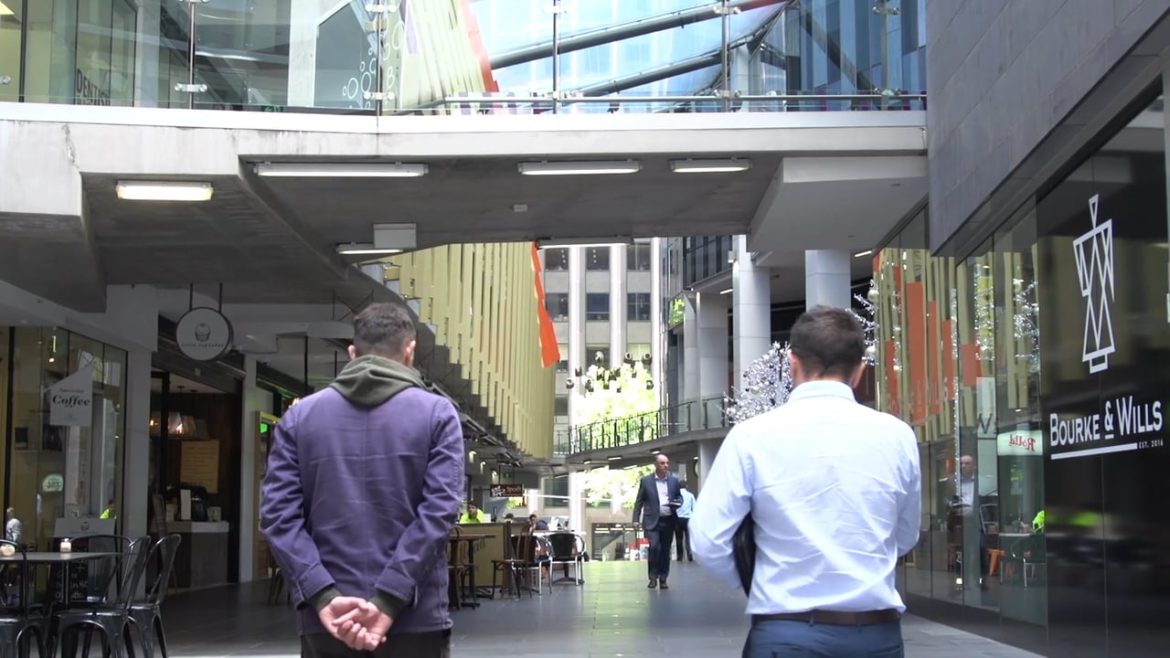Festival of Live Art: Shell Game
I’m aware of my appointment all morning. As I go about my day – meetings, research, emailing – there’s a shadow cast over my activities. Not so much a shadow, really: a shape that is given to my day. My thoughts throughout the morning drift in the direction of the South China Sea.
I know from the program that Shell Game by Martin Coutts, part of the third annual Festival of Live Art in Melbourne, is a one-on-one experience. I know that I meet the performer (Coutts) at a secret location in the city and that there is a certain amount of walking. I know too that the work is built around contemporary events in the South China Sea and that we will navigate it using a bespoke version of the Tarot which has been tailored around the reefs and shoals at the centre of growing international tension, the Spratly Islands.
Alright, I probably already know quite a bit about the experience I’m going to have. Except that I don’t know what Coutts looks like. This is obviously a different experience for anyone who does know Coutts. It’s the nature of this kind of work – built out of personal interaction in a smallish arts community – that the experience and ultimately the meaning of the work is changed by your relationship to the artist making the work. Perhaps that’s the case with all art, but in Live Art these relationships are inevitably foregrounded.
In short, it makes the magic work differently.
In the hour between my last meeting and the performance, I’m making decisions on the street to shape how I will approach its opening moments. Iʻve been watching the people around me since I began my trip towards the work. It’s interesting how the city shifts within only a few blocks, from students and tourists to urban professionals.
I arrive at the appointed time to avoid spoilers. (That’s not true, I actually arrive ten minutes early, because I can’t help myself.)
I watch the city going back to work after lunch. So many of the same kind of shirt, light blue with checks or stripes. So many black skirts and high heels. The uniform here is erasure: corporations have little patience for individuality and it shows in the dress code. It makes me wonder about the role of the corporations that fill the buildings around me, how they might be affected by, or implicated in, the flashpoint developing over the Spratly Islands. I imagine the faceless men in the boardrooms that loom over me, reading the fluctuations in the market and risking their fortunes on predicting the outcome.
I notice one of the light blue business shirts sitting nearby. Might be him. Might not. If it is Coutts, he blends in well: he’s almost invisible. I wouldn’t have noticed him at all, if I weren’t already looking at everybody.
I’m considering the people passing by, the crowd thinning as the afternoon gets underway. I imagine them in a world changed by global military conflict. I see their shadows on the ground as the sun comes out. I imagine X-rays and blinding flashes.
A voice says, “Are you Robert?” The blue shirt is standing now, looking at me. Of course it’s Coutts.
He sits down. We talk. We get to know each other a little. I’m talkative. I’m not usually, which suggests Coutts has a facility for conversation. We reflect on the changes in our lives over the last few years – we’re the same age – and he explains the way the piece works. Together we’ll be making a prediction about the outcome of the geopolitical situation currently being played out in the South China Sea. Coutts is collecting Tarot readings from participants in different cities, using a deck that subtitutes the Spratly Islands for the Major Arcana.
We chat as we travel between the locations for each draw of the reading. We talk about ritual. We talk about power. It doesn’t seem forced, just a natural extension of the conversation already suggested by the architecture around us.
We sit in quiet, powerful foyers. Polished metal spans, towering glass panes, super-high ceilings, subtly-placed security guards, comfortable lounges and reception areas.
I’m not dressed to blend in. It heightens my awareness of our unofficial presence in these places. I trust Coutts has cleared it, but I don’t know for sure. After all, he blends in. The sense of paranoia echoes in the faintly hushed tone Coutts voice takes when he talks directly about China in these spaces, the way his eyes dart around to see who’s in the foyer. As though you never know who might be listening. It’s a respectful but frank discussion of a country that is famously unkeen on criticism and a situation that could easily lead to World War III.
I don’t love that we live in a world where those words don’t sound ridiculous.
The cards I’ve drawn suggest that the current tensions, the balance of compromise and turning a blind eye, will continue for at least the immediate future. The pessimist in me can’t help but think that World War I flared up out of the same protracted, awkward balance of alliances and agreements.
It’ll be interesting to see if the cards are right.
Right now, very few of them seem to point in happy directions.
Shell Game by Martin Coutts. Dramaturgy by Jason Mailing, design by Ella Sutherland. Presented in secret locations around Melbourne until March 21. FOLA: Festival of Live Art 2018.

